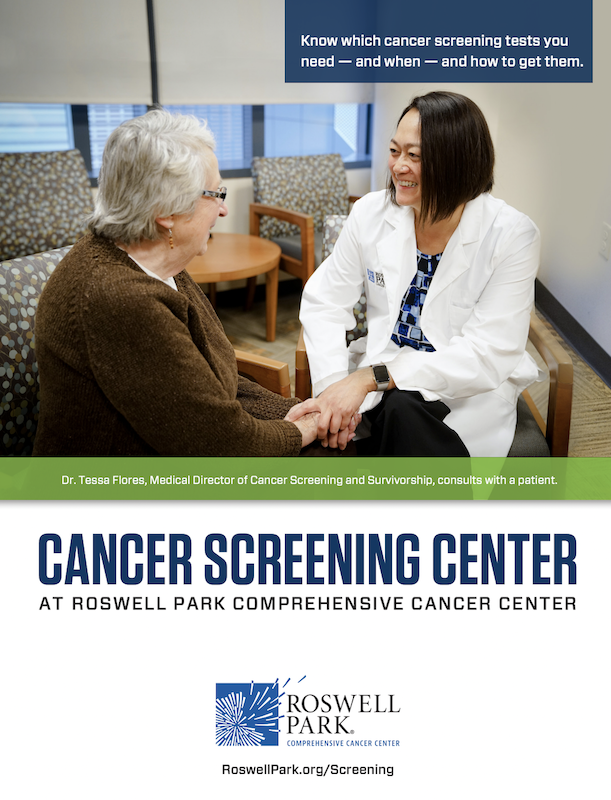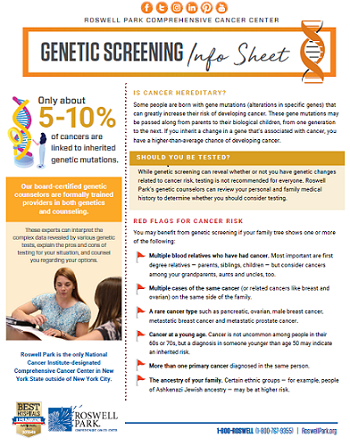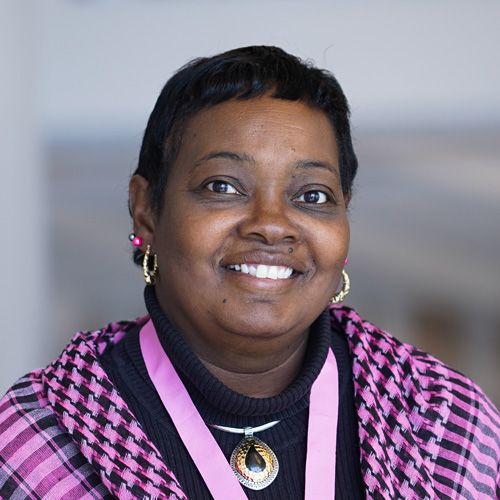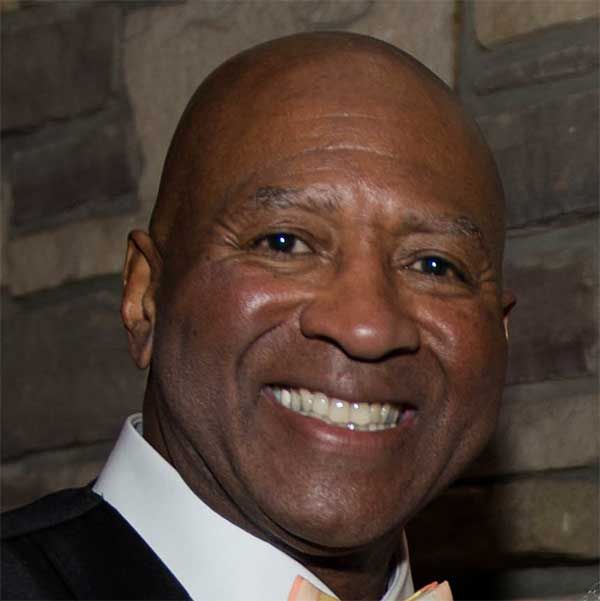Life has opened back up.
Now it’s time to get back to health.
If you’ve waited to schedule your cancer screening, delayed your doctor’s appointments or are ignoring that lingering symptom that is just not right – now is the time to act.
Where to start
Have questions about which screenings and when, or whether a personal or family history of cancer affects your risk? We can help. Take our quiz to learn which cancer screenings you need now.
If you have cancer, you need Roswell Park
If you’ve been diagnosed with cancer, don’t wait. You need a plan and you deserve the expertise of a comprehensive cancer center.
Request an AppointmentGet Screened
If you know you’re due for a cancer screening, schedule it today! Roswell Park offers screening programs for lung cancer and breast cancer at both our downtown and select Roswell Park Care Network locations. To determine your eligibility for those programs, click below.
Schedule a Lung Cancer Screening Schedule a MammogramKnow Your Screening Needs
Make sure you understand what screenings you need based on your personal and family history to detect cancer at its earliest stages, when it’s most curable.
Stay Informed
How often do you need a colonoscopy? When should you begin mammograms? Download our info sheet to stay on track.
High-Risk Cancer Programs
Roswell Park offers programs for people who have higher than normal risk for certain types of cancers due to family history, genetic mutations, cancer susceptibility syndromes, smoking history or other criteria. The programs offer appropriate screening, surveillance and preventive options to help you manage your risk.
Check for Symptoms
Nobody wants to think that odd new symptom, pain or bothersome bump is cancer. The fact is that too many people with cancer have diagnoses that could have been detected earlier if they hadn’t skipped screenings or ignored warning signs.
Check for your symptoms and if you’re experiencing any of the warning signs, talk to your doctor.
- Mole that changes in color, size or feel, or that bleeds
- Bleeding or scabbing sore that heals and returns
- Firm, red nodule
- Lesion with a scaly, crusted surface or one with irregular border and red, pink, white, blue or blue-black portions
- A breast lump, or a change in breast size, shape, color or how it feels (hard, tender, warm, irritated or itchy)
- Visible changes to the breast skin, such as redness and pitting, or flaking, peeling nipple skin
- Pain in or on any part of the breast
- Abnormal menstruation or discharge, spotting between periods or heavy flow
- Pelvic pain or pain during sex
- History of abnormal pap smears
- A persistent change in bowel habits (diarrhea, constipation or a change in stool consistency, such as stringy poop)
- Rectal bleeding or blood in your stool
- Persistent abdominal discomfort, (cramps, gas, pain, or feeling that bowels don’t empty completely)
- Mouth sore or swelling that won’t heal
- Jaw pain or difficulty chewing, swallowing or moving the jaw or tongue
- Lump, bump or mass on head or neck
- Persistent sore throat, hoarse voice, or difficulty speaking
- Urinary symptoms (weak, interrupted urine flow, increased frequency, or pain or burning)
- Blood in your urine
- New onset of erectile dysfunction
- A cough that doesn't go away after 2 to 3 weeks, or a long-standing cough that gets worse
- Coughing up blood
- Chest infections that keep coming back
- An ache or pain when breathing or coughing
If you are experiencing any of the above symptoms, please contact your primary physician for an initial workup.
Genetic screening: Does cancer run in your family?
While most cancers occur by chance and are caused by gene changes that happen during your lifetime, approximately 5 to 10% of all cancers are due to an inherited genetic change, called a mutation, to specific genes. These mutations can be passed from parents to children, generation after generation, and result in a higher risk for developing certain types of cancers.
“Early detection and persistence saved my life. This experience made me a more humble, caring, new person.”
“I thought of my father and brothers and decided it would be good to know where I stood right now. I got tested early and it saved my life.”
“Staying on top of your checkups and taking advantage of these screenings can literally save your life. If sharing my story will encourage someone to get checked, then I’m happy to do it.”





